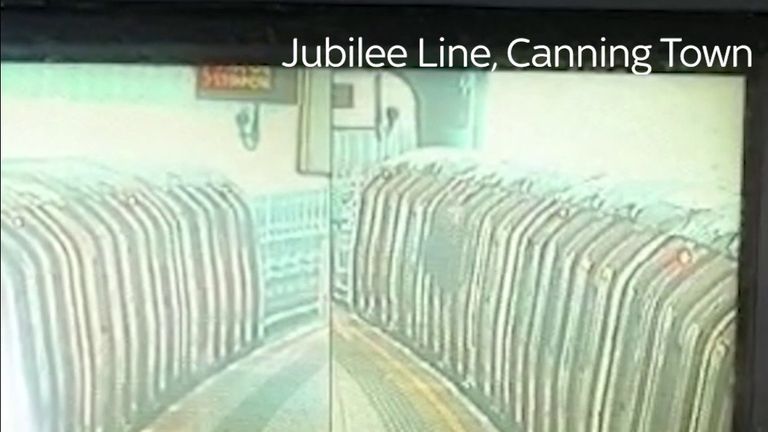Coronavirus: Commuters told to face away from each other when they can't maintain social distancing
People in England are being told they should be "thinking carefully about the times, routes and ways you travel".
Tuesday 12 May 2020 11:59, UK
People using public transport in England have been told they should avoid eating and drinking while travelling and to face away from others when they cannot maintain social distancing.
The Department for Transport has issued on how to travel safely during the coronavirus pandemic.
It comes as the government begins to ease the COVID-19 lockdown, which was introduced at the end of March to slow the spread of the virus.
Those who cannot work from home are being "actively encouraged" to return to work this week, raising the prospect of increased numbers of people on buses, trains, trams and the London Underground.
Commuters packed some Tube trains the morning after Prime Minister Boris Johnson revealed his plan for easing the lockdown in England.
Footage showed platforms at Canning Town and Queensbury stations on the Jubilee Line filled with passengers early on Monday morning.
A Tube driver, who asked to remain anonymous, said there was "no social distancing going on".
Unions have expressed concerns about people returning to work, warning both passengers and staff could be put at risk.
The Rail, Maritime and Transport union (RMT) has advised its members not to work if they felt unsafe.
The PM has downplayed suggestions there will be a "sudden big flood" of people heading back to work.
"I think a lot of people will now start to think whether they fall into that category, whether they could think about going back to work," he told Monday's COVID-19 briefing.
The DfT guidance urges people to consider driving, cycling or walking to work to make sure there is enough capacity for those who need to use public transport to do so safely.
Those who do travel should be "thinking carefully about the times, routes and ways you travel".
Transport Secretary Grant Shapps has warned that even as services begin to return to normal, the two-metre social distancing requirement will mean there is only capacity for one in ten passengers on parts of the network.
People who use public transport are recommended to:
- Keep two metres apart from others wherever possible
- Wear a face covering if they can
- Use contactless payment to complete their trip where possible
- Avoid travelling at rush hour if they can
- Wash or sanitise their hands as soon as possible before and after travel
- Follow advice from staff and be considerate to others
When on public transport, passengers should minimise the time they spend near other people and avoid physical contact with them.
The DfT guidance recognises that "there may be situations where you can't keep a suitable distance from people", like on busier services or at peak times.
"In these cases you should avoid physical contact, try to face away from other people," the guidance says.
:: Listen to the Daily podcast on , , ,
It goes on: "The risk of infection increases the closer you are to another person with the virus and the amount of time you spend in close contact."
Transport operators have been urged to rearrange, remove or limit seating on services to try and make sure that social distancing can be adhered to.
This could include blocking off seats in close proximity to others and getting rid of face-to-face seating.
Single users of black cabs and minicabs are advised to sit in the back left-hand seat of cars.
Other steps people are advised to take include:
- Waiting for passengers to get off first before they board
- Making sure they maintain social distancing, where possible, including at busy entrances, exits, under canopies, bus stops, platforms or outside of stations
- Being prepared to queue or take a different entrance or exit at stations
- Waiting for the next service if they cannot safely keep your distance on a train, bus or coach
- Respecting other people's space while travelling
- Avoiding consuming food and drink on public transport, where possible
- Being aware of pregnant, older and disabled people who may need a seat or extra space
- Being aware that some individuals may have hidden disabilities
The transport secretary said: "Transport operators and staff have been working hard to ensure that people who need to get to work are able to do so, including crucial NHS workers and all those on the front line of the fight against the virus.
"Alongside the cycling and walking revolution we are launching, and clear guidance to passengers and operators published today, we can all play our part by following the advice and reducing pressure on public transport.
"If we take these steps, all those who need to use public transport should feel confident that they can do so safely, with the space to maintain social distancing as far as possible."
Labour's shadow transport secretary Jim McMahon said: "This guidance fails to answer the fundamental question, how do you stop the transport network being overwhelmed when it's currently running at a fraction of capacity?
"The scenes we saw on public transport services yesterday were unsurprising when you order a return to work with 12 hours' notice with no official guidance on how workers can keep safe and fail to put in place suitable measures to deal with demand."








